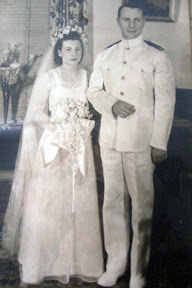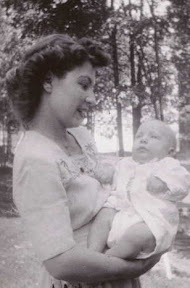The young couple had celebrated their 2nd wedding anniversary on May 7.
German forces in Berlin had surrendered the city to Soviet troops on May 2, 1945, and the western allies celebrated V-E Day on May 8.
They may have had a romantic dinner,
perhaps a bottle of wine.
A gentle spring breeze was blowing through their bedroom windows,
stirring the curtains ever so slightly.
Forces beyond their control had brought them together.
Cy was born and raised in the tiny town of Gordon (pop. 2,000) in the northwestern part of the Nebraska panhandle.

He began college at Creighton University in Omaha but transferred to Chadron College after his mother's untimely death and graduated from Chadron with an A.B. degree in 1935,
the first of his family line to earn a college degree.
Cy's father Bill, was a rough-shod railroad foreman with steely-blue eyes
who fell in love with Mae, the beautiful Irish daughter of 2nd generation immigrants.
Mae's parents Dennis and Mary moved from Sheboygan Falls, Wisconsin to homestead in some of the last land available in the U.S. in the sand hill country near Gordon.
Mae's father died in his 40s, leaving her mom to raise the family and run the ranch by herself.
Mary was one tough cookie - a great horsewoman and cook.
Bill's ancestors immigrated to the New World from England in 1635 and moved west with the first wave of Mormons to leave New England in the 1830s. His great-grandfather John had been a close associate of Joseph Smith and crafted the ironwork for the first Mormon temple in Kirtland, Ohio outside of Cleveland.
Cy was 16 at the beginning of the Great Depression, and he vowed to make a better future for himself than was available to a young man in the vast emptiness of the High Plains during those hard years.
After college graduation, Cy moved to Washington, DC to put himself through George Washington University Law School, taking classes at night while working for the WPA during the day. He received a Juris Doctor degree in 1939 and was commissioned an Officer in the U.S. Navy.
Millie moved to Washington, DC from Plant City, Florida

Her great-great grandfather had been a circuit-riding Methodist preacher, school teacher and teacher of singing schools
 to the sparsely-populated mountains of North Carolina during the early 1800s.
to the sparsely-populated mountains of North Carolina during the early 1800s.Cy was 26, and Millie was 20 on September 1, 1939 when Hitler invaded Poland and sparked World War II. On September 3 the United Kingdom, Australia, New Zealand and France responded by declaring war on Germany. Japan attacked the U.S. Naval base at Pearl Harbor on December 7, 1941. On December 11 Germany and Italy declared war on the U.S. About 62 million people, or 2.5% of the world's population died in the war.
Cy was commissioned an officer and spent the war as a U.S. Navy lawyer at the Pentagon.
They met while working for the Navy Department in the Navy Annex, which overlooks the Pentagon.
Their wedding was held in Plant City, Florida on May 7, 1943. He was just a month shy of his 30th birthday and cut a dashing figure in his Navy dress whites. She looked the part of a southern belle at age 24 in her long white lace gown.

At the consummation of their love on that warm spring night,
his DNA merged with hers,
and a new being was formed.
who in turn inherited their instructions from their parents and so on back to the beginning of life on this planet.
She would have been about 11 1/2 weeks pregnant,
and I would have been about the size of a kidney bean
on August 6, 1945 - the day the Enola Gay dropped the atomic bomb dubbed "Little Boy" on Hiroshima.
Three days later, a B-29 named Bockscar dropped the second atomic bomb, "Fat Man" on the port city of Nagasaki. The Japanese surrendered on August 14, or V-J Day.
On a cold Valentine's night in Arlington, Virginia on 1946,
it was almost midnight when

a young mother brought her firstborn into the world
who now writes this post.
